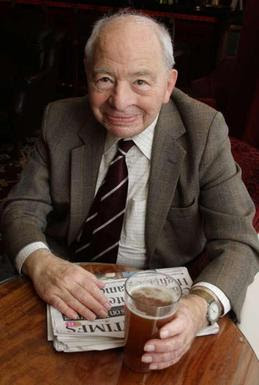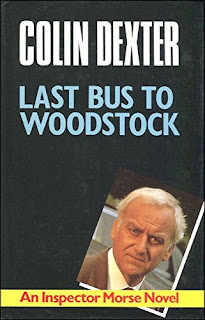After a fitful ride on Last
Bus to Woodstock
I
doubt I shall read anything more by Colin
Dexter. Ever again. I can't remember when a book has disappointed
me—angered me—as much as this first in Dexter's thirteen-book
series of Inspector Morse crime novels. I admit it would be
convenient to put the blame on someone other than myself for steering
me there, but I can’t. Not even my crime-blogging friends, whom
I’ve let persuade me to try authors I’d never heard of. Nope, not
this time. I’m stuck with it. Taking a cue from Jimmy Buffett’s
Margaritaville, it's my own damned fault.
I say this by way of
cautioning readers who enjoyed the TV series based on Dexter’s
characters: Inspector Morse, its spinoff sequel
Inspector Lewis, and its prequel, Endeavour (which is
Morse’s first name). I haven’t yet seen any of the Morse
series, but I’ve watched some episodes of Lewis, and of
Endeavour, and enjoyed
them immensely. Ordinarily if I like a film based on a book, I’ll
give the book a shake. And I’ve found more often than not the
original’s even better than its screen adaptation, or at least is
engaging and entertaining in its own way. This was the case with the
Inspector Gently TV series. The lead character in Gently
Does It, the first of Alan Hunter’s forty-six books
featuring the North British detective, was quite different from the
TV Gently. It took some getting used to, but I enjoyed the read. Not
so with Last Bus to Woodstock,
which presents Inspector
Morse as an unintentional (I’m guessing) parody—something as
unpleasant to imagine as, say, Adam Sandler portraying Sherlock
Holmes.
 |
| Kevin "Lewis" Whately" and John "Morse" Thaw |
I should note that while
the author handled the murder mystery competently, worthy of the TV
series, his detective is boring and arrogant. Morse treats his
assistant, Sgt. Lewis, with such contempt I felt at times like
reaching into the story and slapping the feces out of Morse. In a
bar, for example, while the two are interviewing witnesses in the
murder of a young woman found outside with her head bashed in, the
bartender offers Lewis a beer. “He’s on duty,” Morse snaps, but
accepts a drink himself.
In fact, it appears Morse is a
delusional lush. Sitting in his office, “mildly drunk,” he
believes he’s gaining some insight into the case. “His
mind grew clearer and clearer. He thought he saw the vaguest pattern
in the events of the evening of Wednesday, 29 September. No names–no
idea of names, yet–but a pattern.” Yeah, right.
At
another time, stuck at home
recuperating from an injury to his foot from falling off a ladder,
Morse bores Lewis with rambling theories about the case, not allowing
Lewis to comment or question anything he says. “A quarter of an
hour later a bewildered sergeant let himself out of the front door of
Morse’s flat. He felt a little worried and would have felt even
more so if he had been back in the bedroom at that moment to hear
Morse talking to himself, and nodding occasionally whenever he
particularly approved of what he heard coming from his own lips.
“‘Now
my first hypothesis, ladies and gentlemen, and as I see things the
most vital hypothesis of all–I shall make many, oh yes, I shall
make many–is this: that the murderer is living in North Oxford...”
In fact, Morse has no evidence at all for this or any of his
other screwball assumptions. I found myself screaming silently at one
point, and suddenly bursting out laughing, as the long-suffering
Lewis, the author tells us, “wished he’d get on with it.”
 |
| Kevin Whately |
Another
thing I found annoying was
the multiple-viewpoint narrative. We’re inside the heads of most,
if not all (I didn’t keep track) of the suspects, which, I know, is
a perfectly valid literary device, but for me it doesn’t work in a
mystery—or at least in this mystery, as the characters are
stereotypes, thus less interesting than had they remained mysteries
themselves, known only through the detectives’ sensibilities. In
Last Bus to Woodstock
none of the characters whose heads I was allowed to enter aroused my
suspicion, despite some clumsy “clues” tossed my way. This left
as likely suspects the few I knew only as Morse knew them. Presumably
a craftier writer could bring off having a character we feel we know revealed
as a surprise in the end as the murderer, but I cannot recall an
example where such was the
case, other than in a straight procedural plot.
 |
| Colin Dexter |
I
found the setting interesting—Oxford and its academic environs.
Several minor characters are academics, and we get much byplay in
this milieu—credible because of Dexter’s background as a classics
teacher. I bought a three-book collection with my Kindle download.
Unless I experience a brain transplant or a metaphysical change of
heart, I shall not be reading either of the other two.
But
I do intend to borrow the public library’s Morse/Lewis DVDs. I know
they’ll be good!
[For
more Friday's Forgotten Books check the links on Patti
Abbott's unforgettable blog]

I have to agree, Mathew, I read a couple of Dexter's Morse books a long while ago and found the author intrusion most annoying. He comes across as a self-satisfied author, showing off his classics knowledge, and in my opinion has been over-rated. I'd also recommend the Endeavour TV series.
ReplyDeleteThanks, Nik.
DeleteWhat? I'm not sure who's delusional here, but I suspect it's you, because you based your unfair expectations on a TV interpretation of a spin-off series based on a book series. This is a wonderful series, and while you're free to dislike it, I think you are being unfair to the books and their author. I've read them all with great enjoyment, both before and after watching the original Inspector Morse adaptations on TV.
ReplyDeletePerhaps it is me who is delusional, Rick. I've been called worse. Thanks for the read and comment.
DeleteI read the first three books in the Morse series, and was not that thrilled with them. Not that I disliked them actively, just not exactly what I was looking for. No, I take that back, I did like the third one: The Silent World of Nicholas Quinn. But I have been told that the next few are really good and I still have copies of several so I will be trying more of them. My husband really liked The Wench Is Dead and has been trying to get me to read it for years.
ReplyDeleteOkay, Tracy, you win. I'll try the third one. I'm hoping Morse has grown a little by then.
DeleteI have one Morse book on my Kindle but try as I might I can't get beyond the first few pages. I loved the series - especially the red Jaguar and the setting, not to mention the wonderful actors. I most especially love ENDEAVOR. But at any rate, like you Mathew, I probably won't be reading any Morse books.
ReplyDeleteWe just may be kindred souls, Yvette!
Delete